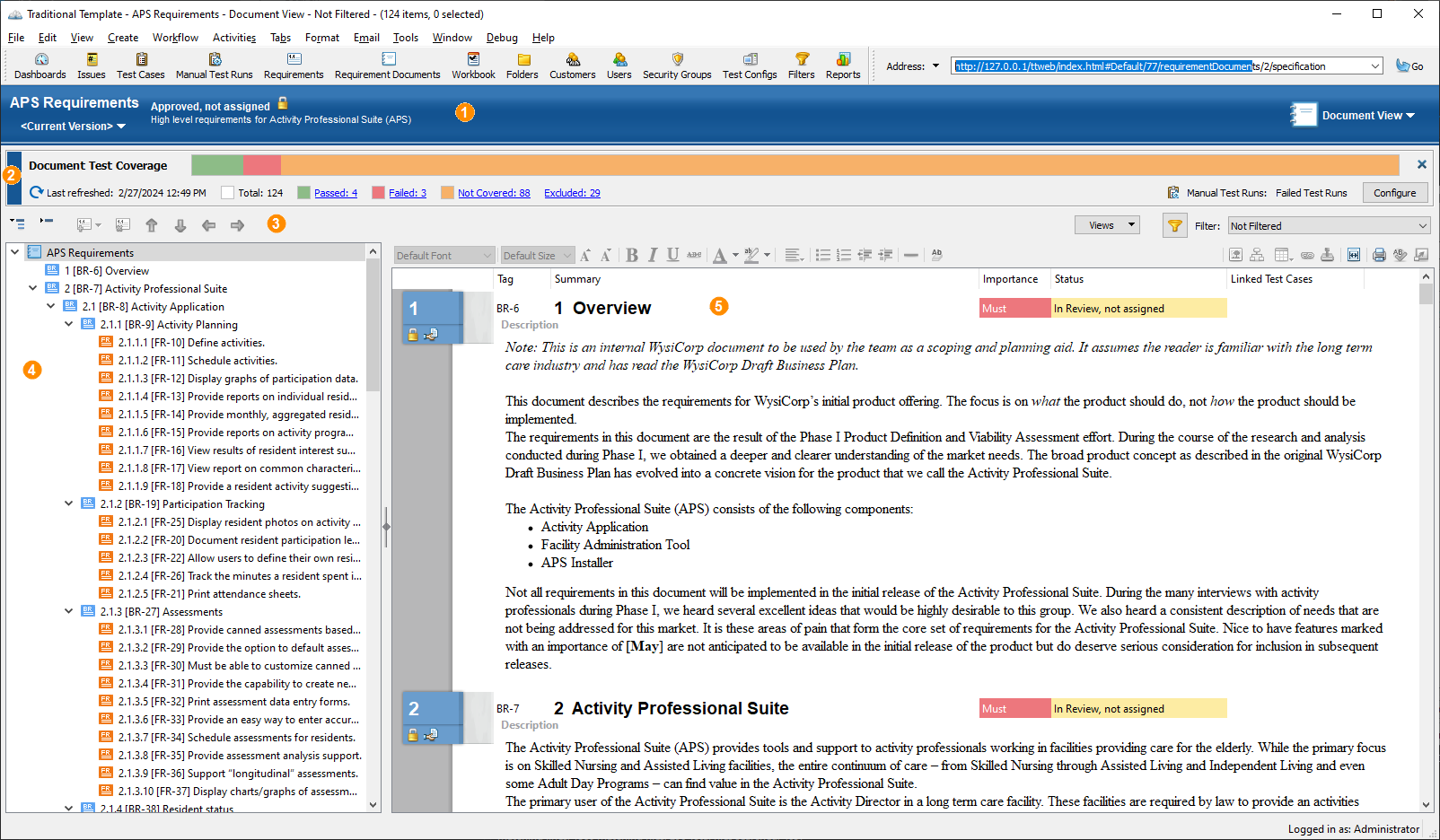Working with requirement documents
Requirement documents display requirements in a hierarchical outline format. Depending on your role, you may modify documents to change the content or only review documents to provide feedback.
1. In the Requirement Documents list window, select the document to view and click Open Specification Document.
The Specification Document window opens.

Information is displayed in the following areas.
| Area | Description |
|---|---|
| Document information | Displays the document name, description, status, and assignment information. Provides access to document snapshots, which are read-only historical document versions. |
| Document test coverage | Displays information about document test coverage statistics. To learn more, see Viewing document test coverage statistics. |
| Toolbars | Provides access to add, move, modify, review, and filter requirements, zoom in and out, save and apply document views, and work with requirement and document review notes. To learn more, see Requirements tree toolbar and Document toolbar. |
| Requirements tree | Displays requirements in the document in hierarchical order. Requirements are labeled with the outline number, tag, and summary. Outline numbers are automatically assigned based on the requirement position in the document. Click a requirement to view it in the contents area. Double-click a requirement to edit it. To learn more, see Editing requirements. |
| Document contents | Displays content for requirements in the document. Indicators, such as locks and flags, are displayed to point out additional information. To learn more, see Requirement and document indicators. To edit a requirement, double-click it. To learn more, see Editing requirements directly in documents. |
2. If you are adding, modifying, or organizing requirements in the document, see Modifying requirement documents.
3. If you are reviewing and commenting on requirements or the document, see Reviewing requirements and documents.
Requirements tree toolbar
Use the requirements tree toolbar to add, reorganize, and remove requirements in the document, expand or collapse requirements in the tree, show or hide requirement information, and search for requirements.

| Button | Use to: |
|---|---|

|
Expand all requirements in the tree. |

|
Collapse all expanded requirements in the tree. |

|
Add existing or add new requirements to the document. See Adding requirements to documents. |

|
Remove the selected requirement from the document. See Removing requirements from documents. |

|
Move the selected requirement up one level in the document hierarchy. |

|
Move the selected requirement down one level in the document hierarchy. |

|
Move the selected requirement out one level in the document hierarchy. |

|
Move the selected requirement in one level in the document hierarchy. |
Document toolbar
Use the document toolbar to navigate and add review notes, customize how requirements are displayed in the contents area, and filter requirements in the document.

| Button | Use to: |
|---|---|

|
Filter the review notes displayed in the document. You can view all notes, only notes you added, all notes added during the current session, all notes added since the last snapshot was created, or you can hide all notes. |

|
Add a review note or comment to the document or selected requirement. |

|
Go to the previous requirement review note in the document. |
 |
Go to the next requirement review note in the document. |

|
Zoom in or out on requirements. |

|
Save the current column configuration and filter applied to the document as a view to use again later, apply a saved view to the document, and manage saved views. See Using requirement document views. |

|
Apply a filter to only display requirements in the document that meet specific criteria. See Applying filters. |